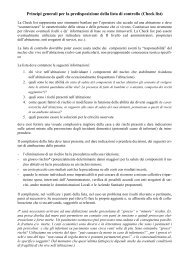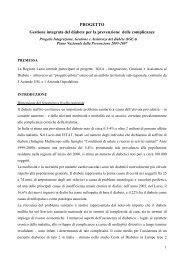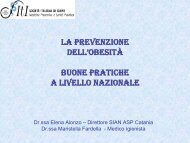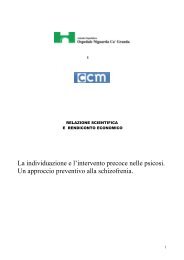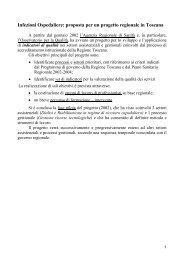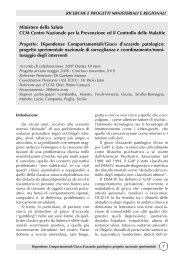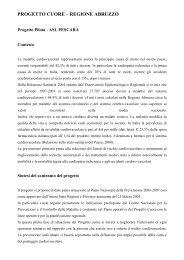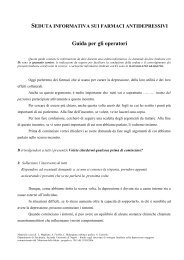Gaining health : analysis of policy development in European ...
Gaining health : analysis of policy development in European ...
Gaining health : analysis of policy development in European ...
You also want an ePaper? Increase the reach of your titles
YUMPU automatically turns print PDFs into web optimized ePapers that Google loves.
<strong>health</strong> <strong>in</strong>surance system. Overall, it appears that a good<br />
work<strong>in</strong>g relationship has been achieved between the M<strong>in</strong>istry<br />
and the Board. The alignment <strong>of</strong> the op<strong>in</strong>ion <strong>of</strong> these<br />
two bodies with that <strong>of</strong> the Parliamentary Health Committee<br />
has been one <strong>of</strong> the factors <strong>in</strong> putt<strong>in</strong>g and keep<strong>in</strong>g public<br />
<strong>health</strong> on the map. An additional player is the President’s<br />
Health Adviser, who can also be <strong>in</strong>fluential.<br />
Involvement <strong>of</strong> the general public is less evident, although<br />
attempts are be<strong>in</strong>g made to address this and, as seen<br />
above, parliamentary discussions on <strong>health</strong> are broadcast<br />
on national radio. A report from the Open Society Fund<br />
states that “the citizens <strong>of</strong> Lithuania are rather hesitant to<br />
participate <strong>in</strong> the formation <strong>of</strong> national <strong>policy</strong>” (12) and that<br />
public <strong>policy</strong> regard<strong>in</strong>g jo<strong>in</strong><strong>in</strong>g the EU, for example, was<br />
consigned exclusively to government <strong>in</strong>stitutions. The same<br />
report argues that the dom<strong>in</strong>ant attitude is still that only a<br />
strong state can satisfy the needs <strong>of</strong> ord<strong>in</strong>ary citizens.<br />
2.1.3. Values and pr<strong>in</strong>ciples<br />
Policies formulated follow<strong>in</strong>g <strong>in</strong>dependence have been explicitly<br />
based on the promotion <strong>of</strong> equality and solidarity <strong>in</strong><br />
<strong>health</strong>. This appears to have been <strong>in</strong>fluenced by strong and<br />
cont<strong>in</strong>ued l<strong>in</strong>ks to activities related to the WHO Health for<br />
All <strong>policy</strong> and by largely successful attempts to improve the<br />
reflection <strong>of</strong> possible <strong>in</strong>equalities <strong>in</strong> the <strong>in</strong>formation base.<br />
Participation <strong>in</strong> multicountry programmes, particularly<br />
CINDI, ensured the cont<strong>in</strong>uous improvement <strong>of</strong> the epidemiological<br />
<strong>in</strong>formation base. The Lithuanian <strong>health</strong> report<br />
– 1990s (10), presented to the First National Conference<br />
on Health Policy <strong>in</strong> 1993, presented regional <strong>in</strong>equalities <strong>in</strong><br />
<strong>in</strong>fant and overall mortality and po<strong>in</strong>ted to the falsity <strong>of</strong> the<br />
traditional belief that <strong>in</strong> a relatively small country like Lithuania<br />
the distribution <strong>of</strong> problems would be more or less<br />
homogeneous. This report apparently became a best-seller<br />
and was repeatedly repr<strong>in</strong>ted.<br />
As part <strong>of</strong> a WHO programme, Lithuania began <strong>in</strong> 1997<br />
to identify all potential sources collect<strong>in</strong>g equality-related<br />
<strong>in</strong>formation (either rout<strong>in</strong>ely or through surveys) and, on<br />
this basis, to make detailed, extensive analyses <strong>of</strong> exist<strong>in</strong>g<br />
data. The result<strong>in</strong>g report on <strong>in</strong>equalities <strong>in</strong> <strong>health</strong> and<br />
<strong>health</strong> care (13) was presented to Parliament and caused<br />
considerable discussion among researchers, politicians and<br />
the media.<br />
The National Board <strong>of</strong> Health keeps the issue <strong>of</strong> equality on<br />
the agenda through its annual reports to Parliament. Health<br />
and <strong>in</strong>equalities <strong>in</strong> <strong>health</strong> are a constant focus <strong>of</strong> the mass<br />
media, particularly the local press. Public awareness can<br />
be said to be high, therefore, and political commitment to<br />
reduc<strong>in</strong>g the gaps is constantly iterated <strong>in</strong> <strong>policy</strong> documents.<br />
Some <strong>of</strong> the changes <strong>in</strong> the <strong>health</strong> sector have hit the<br />
economically weaker groups <strong>of</strong> the population hard. The<br />
plethora <strong>of</strong> <strong>health</strong>-related legislation, however (<strong>in</strong>clud<strong>in</strong>g, for<br />
example, the fund<strong>in</strong>g <strong>of</strong> the new <strong>health</strong> <strong>in</strong>surance system),<br />
<strong>in</strong>dicate a high concern for solidarity and the protection <strong>of</strong><br />
vulnerable groups. It is less easy to discern a broad, systematic<br />
attempt to deal with this challenge by tackl<strong>in</strong>g the social<br />
and economic determ<strong>in</strong>ants <strong>of</strong> <strong>health</strong>.<br />
Work is currently under way on formulat<strong>in</strong>g a <strong>policy</strong> specifically<br />
to tackle <strong>in</strong>equalities <strong>in</strong> <strong>health</strong>.<br />
2.1.4. Sett<strong>in</strong>g the agenda<br />
There is a very strong tradition <strong>of</strong> epidemiological research<br />
<strong>in</strong> Lithuania. Constant attempts are made to improve the<br />
quality and accessibility <strong>of</strong> epidemiological data for <strong>policy</strong><br />
<strong>development</strong>, particularly through active participation <strong>in</strong><br />
<strong>in</strong>ternational research projects, thus further motivat<strong>in</strong>g and<br />
legitimiz<strong>in</strong>g local activities.<br />
Rout<strong>in</strong>e surveys <strong>of</strong> population <strong>health</strong> have been carried out<br />
over a number <strong>of</strong> years, l<strong>in</strong>ked to the CINDI programme,<br />
and more recently there have been surveys <strong>of</strong> the behav-<br />
Chapter 4<br />
195<br />
Case studies: <strong>policy</strong> <strong>development</strong> <strong>in</strong> countries for tackl<strong>in</strong>g noncommunicable diseases



